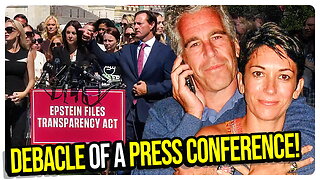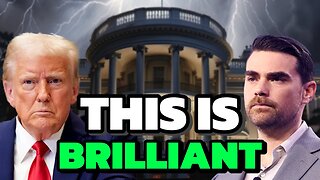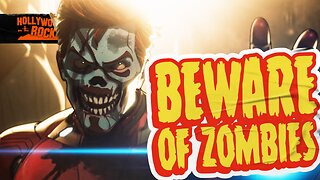Premium Only Content

Concept of Free Choice
Have you ever stopped to think about whether the choices you make in life are truly your own, or if they are predetermined by external factors? Get ready to challenge your beliefs and expand your mind as we explore the intricacies of free will and the illusion of choice.
Let's kick things off by delving into the concept of free will. Free will is the ability to make choices that are not determined by external factors, such as fate or destiny. It's the idea that we have the power to decide our own paths and shape our own destinies. Sounds empowering, right? But what if I told you that our sense of free will may actually be an illusion?
The illusion of free choice posits that our decisions are not as autonomous as we may think. In reality, our choices are influenced by a plethora of internal and external factors that we may not even be aware of. From our upbringing and societal norms to our genetic predispositions and environmental stimuli, a myriad of forces shape our decision-making process.
One of the key factors that contribute to the illusion of free choice is the concept of determinism. Determinism proposes that all events, including human actions, are ultimately determined by causes external to the will. In simpler terms, it suggests that our choices are predetermined by a series of causal factors, leaving us with the mere illusion of control.
Furthermore, cognitive biases and heuristics play a significant role in distorting our perception of free will. Our brains often take mental shortcuts and rely on cognitive biases to simplify decision-making processes. These biases can lead us to believe that we are making rational, autonomous choices when, in reality, we are being influenced by unconscious biases and irrational thinking patterns.
As much as we'd like to believe that we are the masters of our own destiny, the truth is that external forces exert a powerful influence over our decision-making. From advertising and marketing tactics to societal expectations and peer pressure, we are bombarded with subtle cues and messages that shape our preferences and behaviors.
Think about the last time you made a purchase based on a recommendation from a friend or a persuasive advertisement. Did you truly make that choice freely, or were you subtly nudged in a certain direction by external forces? The power of suggestion and social influence can be incredibly persuasive, often leading us to make decisions that align with societal norms and expectations.
Moreover, cultural factors also play a significant role in shaping our choices. The values, beliefs, and norms of our culture can influence the decisions we make, sometimes without us even realizing it. From the foods we eat to the careers we pursue, our cultural upbringing can subtly guide us towards certain paths, limiting our sense of free will in the process.
Psychology provides valuable insights into the complexities of human decision-making and the illusion of free choice. The field of behavioral economics, in particular, explores how psychological factors impact our economic decisions and choices. Studies have shown that our decision-making processes are often influenced by cognitive biases, emotions, and social norms, leading us to deviate from rational decision-making models.
One notable study in behavioral economics is the classic "ultimatum game," where participants are given a sum of money to divide between themselves and another player. Interestingly, participants often reject unfair offers, even when it means forfeiting money, due to a sense of fairness and reciprocity. This behavior challenges traditional economic theories that assume individuals always act in their own self-interest, highlighting the complexities of human decision-making.
Furthermore, research in social psychology has demonstrated the power of conformity and obedience in shaping our choices. The infamous Milgram experiment, for example, revealed how individuals were willing to administer electric shocks to others under the authority of an experimenter, despite their moral reservations. This study sheds light on the extent to which external pressures can influence our decisions, even in morally challenging situations.
The paradox of choice is another fascinating aspect of the illusion of free choice. Contrary to popular belief, having an abundance of choices does not always lead to greater happiness or satisfaction. In fact, too many options can overwhelm us and lead to decision paralysis, where we struggle to make a choice due to the fear of making the wrong decision.
Psychologist Barry Schwartz coined the term "paradox of choice" to describe the phenomenon of diminishing returns as the number of choices increases. While having some degree of choice is empowering, an excess of choices can lead to increased stress, regret, and dissatisfaction. This paradox challenges the notion that more choices always equate to better outcomes, highlighting the limitations of our perceived sense of free will.
So, how can we navigate the illusion of free choice and make more informed decisions in our lives? While we may never fully escape the influence of external forces, there are strategies we can employ to enhance our decision-making processes and cultivate a greater sense of autonomy.
Self-awareness is key to overcoming the illusion of free choice. By reflecting on our values, beliefs, and biases, we can better understand the factors that influence our decisions and make more conscious choices. Mindfulness practices, such as meditation and self-reflection, can help us develop awareness of our thought patterns and emotional responses, allowing us to make decisions from a place of clarity and intention.
Critical thinking is another essential skill for navigating the complexities of decision-making. By questioning assumptions, examining evidence, and considering alternative perspectives, we can challenge our cognitive biases and make more rational choices. Engaging in intellectual debates, reading diverse viewpoints, and seeking out information from reliable sources can help broaden our perspectives and enhance our decision-making abilities.
Moreover, seeking advice and feedback from trusted friends, mentors, or experts can provide valuable insights into our decision-making processes. By soliciting diverse opinions and perspectives, we can mitigate biases and blind spots, leading to more informed and balanced choices. Collaboration and dialogue with others can help us gain new perspectives and expand our awareness of the factors influencing our decisions.
-
 1:28:57
1:28:57
Redacted News
2 hours agoBREAKING! Putin's DEVASTATING news for Europe | Secret UFO Space Base in Huntsville | Redacted Live
85.8K83 -
 1:17:49
1:17:49
vivafrei
5 hours agoEpstein Press Conference DEBACLE! Missing Minute FOUND? Canada Continues to Fall! & MORE!
74.7K58 -
 29:30
29:30
Stephen Gardner
2 hours ago🟢YES! Trump’s Doing It! Ben Shapiro UNLEASHES on Democrat STUPIDITY!
34.4K16 -
 LIVE
LIVE
Dr Disrespect
7 hours ago🔴LIVE - DR DISRESPECT - METAL EDEN - NEW 2025 SCI-FI FPS LAUNCH STREAM
982 watching -
 LIVE
LIVE
StoneMountain64
5 hours agoBattlefield's Easter Egg Phantom Project is STILL ALIVE
93 watching -
 LIVE
LIVE
LFA TV
11 hours agoLFA TV ALL DAY STREAM - WEDNESDAY 9/3/25
1,192 watching -
 LIVE
LIVE
freecastle
7 hours agoTAKE UP YOUR CROSS- Love...Light...TRUTH!
102 watching -
 1:50:29
1:50:29
The Quartering
4 hours agoEpstein Victims To NAME People, Mutiny Over RFK Jr, Trump Turns On Warp Speed?
139K44 -
 1:33:30
1:33:30
Film Threat
22 hours agoMARVEL ZOMBIES! PLUS DEXTER RESURRECTION | Hollywood on the Rocks
17.3K -
 1:06:51
1:06:51
Jeff Ahern
4 hours ago $0.78 earnedNever Woke Wednesday with Jeff Ahern
22.1K